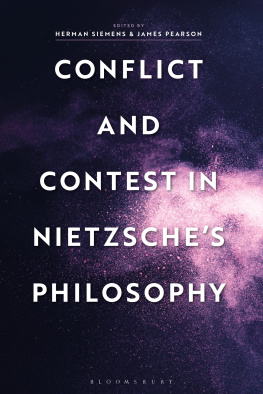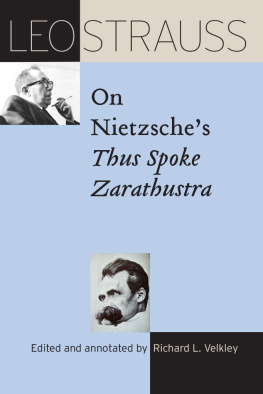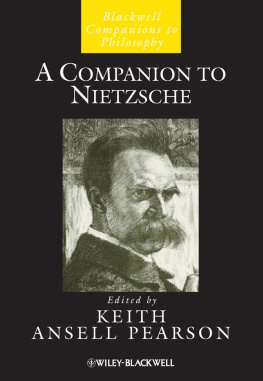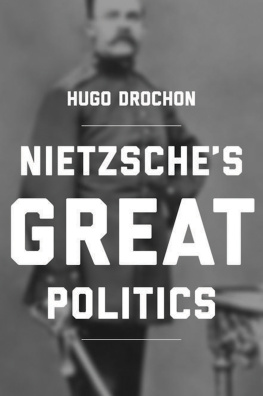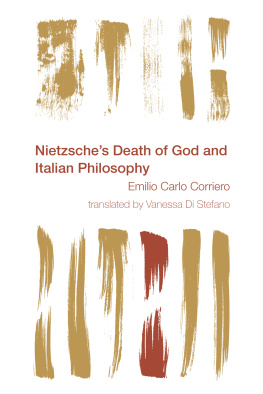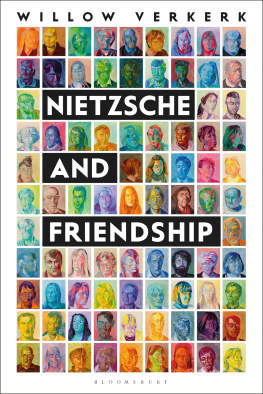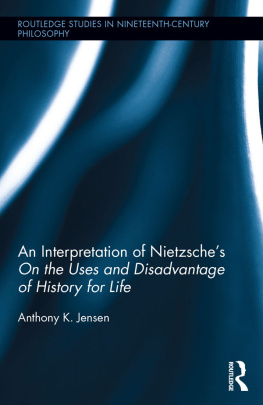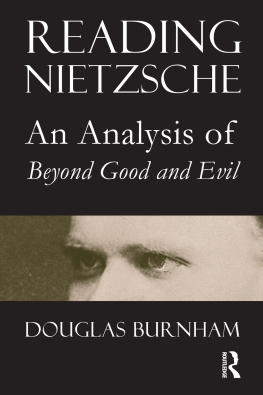Conflict and Contest in Nietzsches Philosophy
Also available from Bloomsbury
Nietzsche and Political Thought , edited by Keith Ansell-Pearson
Nietzsches Engagement with Kant and the Kantian Legacy , edited by Marco Brusotti, Herman Siemens, Joo Constncio, Tom Bailey
Nietzsches Search for Philosophy , Keith Ansell-Pearson
Politics of Happiness: Connecting the Philosophical Ideas of Hegel, Nietzsche and Derrida to the Political Ideologies of Happiness , by Ross Abbinnett
We are haunted by a false concept of harmony and peace as the most useful state. In truth a strong antagonism belongs intrinsically to everything, to marriage friendship state state-alliances corporations learned associations religions, for something worthwhile to come out. Resistance is the form of force in peace as in war [...] (NL 1881 11[303], KSA 9.557)
(Es spukt ein falscher Begriff von Eintracht und Frieden, als dem ntzlichsten Zustande. In Wahrheit gehrt berall ein starker Antagonismus hinein, in Ehe Freundschaft Staat Staatenbund Krperschaft gelehrten Vereinen Religionen, damit etwas Rechtes wachse. Das Widerstreben ist die Form der Kraft im Frieden wie im Kriege [...])
The spiritualization of sensuality is called love: it is a great triumph over Christianity. Another triumph is our spiritualization of enmity. It consists in a profound understanding of the value of having enemies: in short that one does and concludes in a reverse way to what one once did and concluded. ( Gtzen-Dmmerung , Moral als Widernatur 3)
(Die Vergeistigung der Sinnlichkeit heisst Liebe: sie ist ein grosser Triumph ber das Christenthum. Ein andrer Triumph ist unsre Vergeistigung der Feindschaft. Sie besteht darin, dass man tief den Werth begreift, den es hat, Feinde zu haben: kurz, dass man umgekehrt thut und schliesst als man ehedem that und schloss.)
That I must be struggle and becoming and purpose and the Contradiction of purposes: Ah, whoever divines my will, divines Also on what crooked paths it must go!
Even what I create and however I also love it, - soon I Must be its opponent and that of my love: thus wills it my will.
(Life speaks in Thus Spoke Zarathustra I, On Self-Overcoming)
(Dass ich Kampf sein muss und Werden und Zweck und der
Zwecke Widerspruch: ach, wer meinen Willen errth, errth wohl
auch, auf welchen krummen Wegen er gehen muss!
Was ich auch schaffe und wie ichs auch liebe, bald muss
ich Gegner ihm sein und meiner Liebe: so will es mein Wille.)
Conflict and Contest in Nietzsches Philosophy
Edited by
Herman Siemens and James Pearson

Contents
This work is part of the research programme Between Deliberation and Agonism: Rethinking conflict and its relation to law in political philosophy with project number 360-20-290, which was financed by the Netherlands Organisation for Scientific Research (NWO).
The editors would also like to thank the Friedrich Nietzsche Society and Nicholas Martin for organizing the 2014 conference Nietzsche, Love and War . Several chapters in this volume are based on papers given then.
Editors
Herman Siemens is an associate professor of modern philosophy at Leiden University, adjunct professor at the Universidad Diego Portales (Chile) and research associate of the University of Pretoria (South Africa) and the Universidade de Lisboa (Portugal). He is a member of the editorial board of the database Nietzsche Online (Berlin/Boston: De Gruyter) and the editorial advisory board ( wissenschaftlicher Beirat ) of Nietzsche-Studien and the Monographien und Texte zur Nietzscheforschung (de Gruyter). He was the president of the Friedrich Nietzsche Society from 20082016 and co-directs the Nietzsche-Wrterbuch (de Gruyter). He specializes in Nietzsche and post-Nietzschean philosophy, political philosophy and aesthetics. Apart from numerous articles on Nietzsche, he has co-edited Nietzsche, Power and Politics: Rethinking Nietzsches Legacy for Political Thought (de Gruyter, 2008) and most recently the three-volume set Nietzsches Engagements with Kant and the Kantian Legacy (Bloomsbury, 2017), and the forthcoming bilingual volume European/Supra-European: Cultural Encounters in Nietzsches Philosophy (de Gruyter). He currently leads a research programme on political violence and the violence of the image.
James Pearson is a Lecturer in Philosophy at Leiden University. He recently completed his PhD at Leiden University on Nietzsches philosophy of conflict. He is currently working on the relation of nineteenth-century German philosophy to problems in contemporary political theory. His dissertation undertakes a critique of Nietzsches conception of conflict in order to highlight the insufficiency of agonistic and militaristic interpretations of his thought. Aside from Nietzsche, he has published work on Hegel, Freud and Wittgenstein. Recent publications include Language, Subjectivity and the Agon: A Comparative Study of Nietzsche and Lyotard, Logoi , 1 (3) (2015); On Catharsis, Conflict and the Coherence of Nietzsches Agonism, Nietzsche-Studien , 45 (1) (2016); Wittgenstein on the Utility of Disagreement, Social Theory & Practice , 41 (4) (2016); Nietzsche on Agonal Moderation, Journal of Nietzsche Studies , 49 (1) (2018).
Contributors
Christa Davis Acampora is a professor of philosophy at Hunter College and the Graduate Center of the City University of New York. She has written numerous articles and book chapters on Nietzsches moral psychology, critical reception of ancient philosophy, and aesthetics. She is the author of Contesting Nietzsche (University of Chicago Press) and co-author, with Keith Ansell-Pearson, of Nietzsches Beyond Good and Evil (Continuum). Her other books include Critical Essays on Nietzsches On the Genealogy of Morals; Unmaking Race, Re-making Soul: Transformative Aesthetics and the Practice of Freedom ; Cultural Productions of Women of Color ; and A Nietzschean Bestiary . Acampora holds multiple editorial and leadership positions in international Nietzsche organizations, including serving on the editorial boards of Nietzsche-Studien and Nietzsche Online . For more than a decade, she was the executive editor of the Journal of Nietzsche Studies . Her current research focuses on moral injury in the experience of war.
Jonathan Agins is a doctoral candidate in Northwestern Universitys Department of German Literature and Critical Thought. His dissertation examines the motif of Kraft in Robert Musils Der Mann ohne Eigenschaften as a nexus of the texts literary, scientific and ethical dimensions. Since getting his undergraduate degree in German Studies at Stanford University, he has been interested in nineteenth- and twentieth-century German literature particularly those thinkers and writers who have influenced Friedrich Nietzsche or have been influenced by him.
Frank Chouraqui (PhD Warwick, 2011) is an assistant professor in contemporary continental philosophy at Leiden University. His research focuses on Nietzsches ontology of power and on phenomenological ontology. He is the author of Ambiguity and the Absolute: Nietzsche and Merleau-Ponty on the Question of Truth (Fordham University Press, 2014) and of several articles on phenomenology and on Nietzsche.
Nicolas Lema Habash is a doctoral candidate in philosophy at the University of Paris 1, Panthon-Sorbonne. He holds a masters in ancient philosophy from the University of Oxford. He also completed studies in philosophy at the Australian National University and in history and aesthetics at the Universidad Catlica de Chile. His current doctoral research focuses on Spinoza and contemporary French philosophy. He has published on ancient and modern philosophy, film and art theory, and Latin American cinema and literature.

